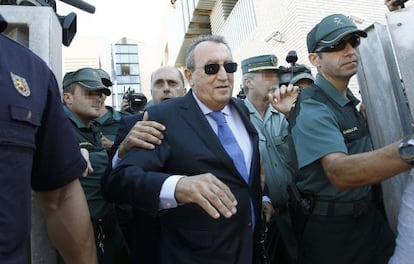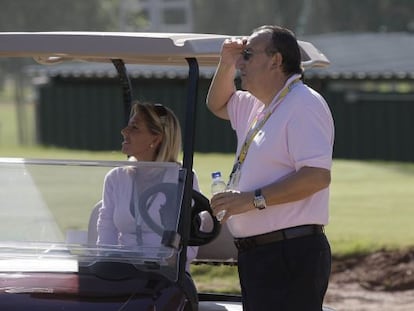The law finally catches up with former Castellón cacique Fabra
Bringing the PP baron to court has been like running an obstacle course


The trial of former Castellón provincial chief and powerful Popular Party (PP) baron in the region of Valencia, Carlos Fabra, for alleged influence-peddling, bribery and tax fraud began on Wednesday, a decade after the first accusations were lodged against him.
In its written allegations, the popular prosecution in the form of the consumer protection group Unión de Consumidores described Fabra as a "magician in obtaining illegal ends."
Unlike on other occasions he has appeared in court the 67-year-old Fabra, who faces a jail sentence of up to 13 years and a fine of 1.9 million euros if found guilty, was not accompanied by anyone from his party.
Prosecutors have accused Fabra and his former wife, María Amparo Fernández, of defrauding the Treasury of some 700,000 euros between 1999 and 2003. However, Fabra's lawyer on Wednesday argued that tax inspectors who handled the case could not be considered as independent expert witnesses as they are administration assistants of the Anti-Corruption Prosecutor's office.
The public prosecutor also claims Fabra acted as an intermediary for third parties with public administrations and accepted money for doing so.
The three magistrates conducting the trial are the same ones that attempted to have the accusation of taking bribes lodged against Fabra thrown out. Neither the state nor the public prosecutor have questioned their fitness to preside over the trial.
Since the case began in December 2003 — following accusations by a businessman that Fabra had taken bribes to intervene with the Agriculture Ministry to obtain permits — nine judges and four prosecutors have been involved in it. While the investigation proceeded, Fabra continued in his post as Castellón provincial chief, handling public money and presiding over the PP's affairs in his particular fiefdom.
The magistrates conducting the trial are the same ones that attempted to throw out the accusation of taking bribes
Part of the public's money went to build an airport at Castellón, which has never been used as such, with the facilities dominated by a huge statue of Fabra himself. That was just one of several pharaonic monuments to human folly and hubris that marked a boom period in the region fueled by a massive real estate bubble.
During that period no one in the PP demanded that Fabra account for the accusations lodged against him. The head of the PP and now prime minister, Mariano Rajoy, at one point lauded Fabra as an "exemplary citizen."
Fabra even tried to prevent the distribution of newspapers that had reported on the case and the judge who eventually formalized the accusation against him, Jacobo Pin, felt the need to seek the protection of the General Council of the Judiciary (CGPJ), the legal watchdog, after claiming that the Castellón Provincial High Court, the president of which was a personal friend of Fabra, had tried to put pressure on him to drop the case. Pin's complaint went all the way to the Supreme Court, who gave the magistrate "total freedom" to proceed with the case.
After the Castellón Provincial High Court in 2010 threw out four of the five tax fraud charges against Fabra because they had exceeded the statute of limitations, it was again the Supreme Court that intervened to over-rule that decision.
Members of Fabra's family were also included in the investigation after a report found that it had quadrupled its combined wealth in five years, but eventually only his former wife was formally accused. Fabra himself won a major prize in the national lottery no less than four times. One way of laundering illegally obtained money is to purchase winning lottery tickets.
Fabra has denied all the charges against him and at one point defended himself by saying: "I have never personally benefitted from my position as provincial chief of Castellón or as president of the Popular Party in the region. My public duties have never brought me any gain or revenue or than my official remuneration."
Tu suscripción se está usando en otro dispositivo
¿Quieres añadir otro usuario a tu suscripción?
Si continúas leyendo en este dispositivo, no se podrá leer en el otro.
FlechaTu suscripción se está usando en otro dispositivo y solo puedes acceder a EL PAÍS desde un dispositivo a la vez.
Si quieres compartir tu cuenta, cambia tu suscripción a la modalidad Premium, así podrás añadir otro usuario. Cada uno accederá con su propia cuenta de email, lo que os permitirá personalizar vuestra experiencia en EL PAÍS.
En el caso de no saber quién está usando tu cuenta, te recomendamos cambiar tu contraseña aquí.
Si decides continuar compartiendo tu cuenta, este mensaje se mostrará en tu dispositivo y en el de la otra persona que está usando tu cuenta de forma indefinida, afectando a tu experiencia de lectura. Puedes consultar aquí los términos y condiciones de la suscripción digital.









































